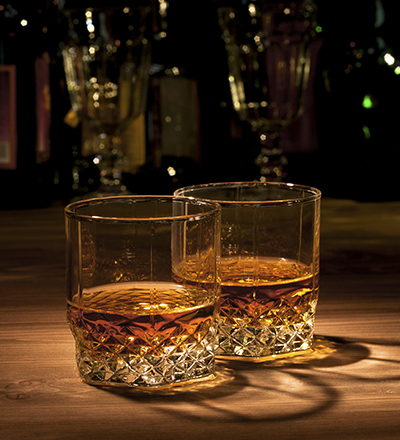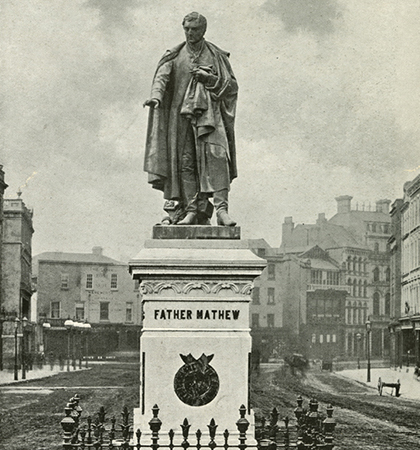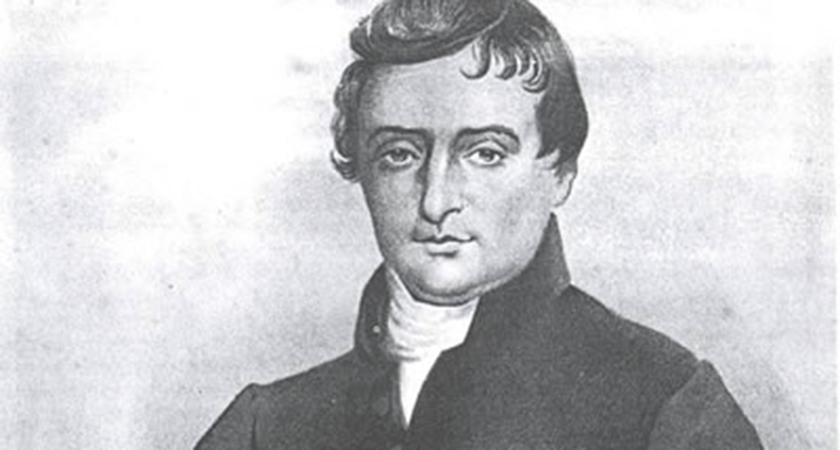1. Ireland and alcohol — a long history
Father Theobald Mathew’s rise to fame is a direct result of Ireland ‘s long history with alcohol. The word whiskey is from the Irish ‘uisge beatha’ meaning literally ‘water of life, and it's no coincidence that the oldest whiskey distillery in the world, Bushmills, is near Coleraine — the place where the very first settlers to Ireland arrived some 9000 years ago. Crossing from Scotland they settled near Mount Sandell. And what could be more natural after their long journey than a relaxing drink?
Drinking, we can assume began early doors in Ireland.
2. A hunting party becomes a wine and cheese party — without the cheese
Picture the scene: a party of stone-age travellers near Coleraine, stumbling on the juice of fermented vegetable matter. Delighted, they scoff it down; then something peculiar happens. They miraculously find they can cheerfully say 'boo' to a woolly mammoth while their friends giggle themselves silly behind a rock. However the next day for some strange reason nobody feels quite up to a full stint of hunting and gathering.
It was the start of a long love affair with the gargle. Only a few millennia later, Father Mathew was needed.
3. Seriously langered by the 19th century
By the 19th century, alcohol usage was deemed to have reached problematic proportions throughout the island. Traditional Irish scenes — such as the late night chip van brawl, which is today ubiquitous — have their roots in this ancient time.
Something needed to be done, and quickly. Step forward Father Theobald Mathew who embarked on what, ultimately, proved to be an impossible task — to rid Ireland of alcohol.
4. The Tipp man who didn’t like a tipple
Father Mathew, born in 1790 in Thomastown, Co. Tipperary, launched his "Cork Total Abstinence Society" in 1838. Designed to keep a person sober for life, the Pledge could be made by anybody, “either with or without an alcohol problem”.
5. Launch of the abstinence party — no champagne please
The teetotal priest launched his abstinence society with the words: “"Here goes in the name of Ireland." Many people could be heard raising their glasses and saying: “Well, we’ll all drink to that.”
6. Ireland goes on the wagon
But many people did heed the call of the teetotaller from Thomastown. In less than nine months some 150,000 names were enrolled on the Pledge list. Presumably a lot of them were people tired of waking up the next morning thinking, what was I playing at . . . . the singing . . . the fist fight . . . .the kissing . . . the tears. . . . how did I get home? Where are my shoes?
The movement rapidly spread to Limerick and subsequently to all parts of Ireland, and from 1838 to 1844 government revenue from drink fell by half a million pounds — an astronomical sum in those days.
Then the Famine came, and Ireland was changed for ever.
 7. Whiskey in trouble
7. Whiskey in trouble
The Famine almost finished off the whiskey trade in Ireland. But the industry did manage to survive, just about, only to be met by another obstacle — Father Mathew. The priest’s phenomenal success in the early days of his campaign was partly responsible for the stalling of the Irish distilling industry. Sales suffered dramatically, and Scottish whisky assumed the market lead — a position it has more or less maintained.
8. A dismal record
Despite his early victories, Father Mathew, long-term his endeavours failed. Depending on which statistics you consult, Ireland today is amongst the top three or four heaviest drinking nations in the world.
A recent EU report revealed that the Irish drink almost twice as much alcohol as the EU average.
9. Father Mathew Stateside
The priest took his campaign to America, but many on the civil rights side were aghast that an Irishman could come to the US to call for the abolition of alcoholic drinks, while ignoring calls to speak out for the abolition of slavery.
Father Mathew argued that there was nothing in the scriptures that prohibits slavery
 10. Father Mathew’s fate
10. Father Mathew’s fate
Sad to relate, the Cork priest’s campaign to rid Ireland of drink bankrupted him. In a further twist of fate, Father Mathew died aged 66 after becoming prematurely senile.
11. Father Mathew honoured
Father Mathew, then, had somewhat lukewarm success in his quest to rid Ireland of the demon drink. Today, social life still revolves round the gargle — in Ireland when you’re born your family get hog-whimperingly drunk to celebrate your arrival; when you get married another huge piss-up takes place, and when you depart you’ll leave to the sound of someone shouting, “Has anybody seen the spare bottle opener?”
Nonetheless, there is a statue to Father Mathew on O’Connell Street in Dublin, and one in Cork.
12. For fast relief
Father Mathew will probably be revolving at high speed in his grave at some recent statistics: three-quarters of all wine bought in Ireland is consumed within four hours of having bought it, according to a survey. Essentially, as soon as we get home from the supermarket, we rip the bags open and get at the vino. The concept of laying down a cellar seems still to be in in its infancy.
The figure is backed up by Alcohol Ireland’s figure that 75 per cent of all alcohol consumed in Ireland (back in 2013) is done as part of a binge drinking session. There seems little chance that the figures for 2014 or 2015 will be any better, and presumably we will continue to believe that there is no imperative to leave a pub until we are physically removed.


